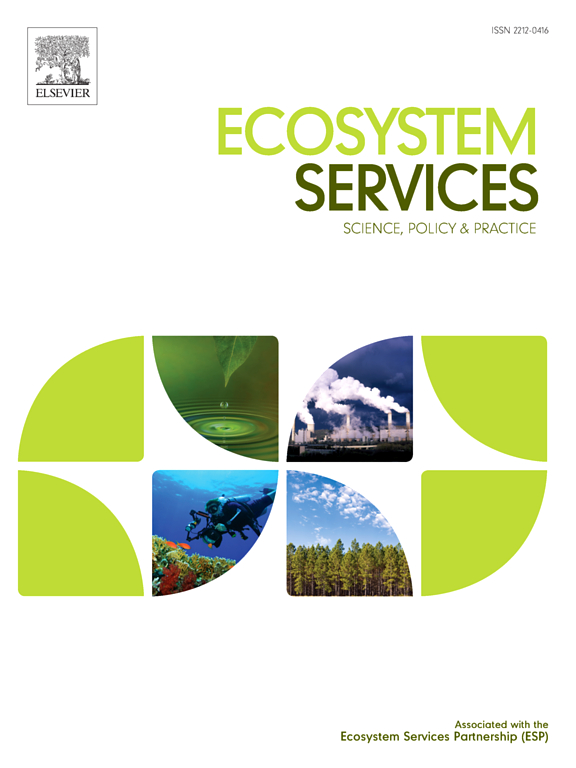Who should control the provider of ecosystem services in buyer-driven governance? A choice experiment on orchards in Germany
IF 6.6
2区 环境科学与生态学
Q1 ECOLOGY
引用次数: 0
Abstract
Buyer-driven governance arrangements have emerged as a promising innovative approach to mitigate the degradation of ecosystem services (ES) in agricultural landscapes. In such arrangements, ES buyers, such as consumers, support ES provision by remunerating farmers to adopt sustainable agricultural practices through market-based mechanisms, such as price premiums for (certified) sustainably produced products. In this context, effective compliance enforcement is essential, as it assures ES buyers that the services are delivered in accordance with agreed guidelines. Consequently, the level of trust ES buyers place in the organisation responsible for enforcing compliance is critical. We applied a discrete choice experiment to investigate ES buyers’ preferences for the organisation responsible for compliance enforcement for sustainably produced agricultural products. The survey used conventionally managed apple orchards in Germany as a case study and focused on the implementation of ES measures (flower strips, hedgerows, flower strips plus hedgerows, and mechanical weed control instead of chemical control) to support regulating (biological pest control and pollination), cultural (enhancement of landscape aesthetics), and provisioning ES (production of marketable fruits). To elicit preferences regarding compliance enforcement, the survey included four organisations: a state agency, a farmers’ association, a conservation NGO, and a representative body – composed of relevant societal actors collectively responsible for implementing compliance enforcement. The survey included a representative sample of 901 ES buyers (apple consumers) drawn from the German population. We find that most ES buyers trust conservation NGO, representative body, and farmers’ association, while less than half trust state agency; furthermore, ES buyers are willing to pay a substantially higher premium when a trusted organisation is enforcing compliance. Regarding ES measures, we find that ES buyers are willing to pay price premiums for all measures supporting ES provision, with higher premiums for mechanical weed control and the combination flower strips plus hedgerows.
在买方驱动的治理中,谁应该控制生态系统服务的提供者?德国果园的选择实验
买方驱动的治理安排已成为缓解农业景观中生态系统服务(ES)退化的一种有希望的创新方法。在这种安排中,消费者等生态系统购买者通过市场机制,如(经认证的)可持续生产产品的溢价,奖励农民采用可持续农业做法,从而支持提供生态系统。在这种情况下,有效的遵从性执行是必不可少的,因为它向ES购买者保证服务是按照商定的指导方针交付的。因此,ES购买者对负责执行合规性的组织的信任程度至关重要。我们采用离散选择实验来调查ES购买者对负责可持续生产农产品合规执行的组织的偏好。该调查以德国传统管理的苹果园为例,重点研究了ES措施(花条、树篱、花条加树篱,以及机械杂草控制而不是化学控制)的实施情况,以支持调节(生物害虫控制和授粉)、文化(增强景观美学)和供应ES(生产可销售的水果)。为了了解人们对合规执行的偏好,调查包括了四个组织:一个国家机构、一个农民协会、一个环保非政府组织和一个代表机构——由相关的社会行动者组成,共同负责实施合规执行。该调查包括901名德国消费者(苹果消费者)的代表性样本。研究发现,大多数ES购买者信任环保非政府组织、代表机构和农民协会,而信任国家机构的不到一半;此外,当一个值得信赖的组织执行合规性时,ES买家愿意支付高得多的溢价。在ES措施方面,我们发现ES购买者愿意为所有支持ES提供的措施支付溢价,其中机械除草和花带加树篱组合的溢价更高。
本文章由计算机程序翻译,如有差异,请以英文原文为准。
求助全文
约1分钟内获得全文
求助全文
来源期刊

Ecosystem Services
ECOLOGYENVIRONMENTAL SCIENCES&-ENVIRONMENTAL SCIENCES
CiteScore
14.90
自引率
7.90%
发文量
109
期刊介绍:
Ecosystem Services is an international, interdisciplinary journal that is associated with the Ecosystem Services Partnership (ESP). The journal is dedicated to exploring the science, policy, and practice related to ecosystem services, which are the various ways in which ecosystems contribute to human well-being, both directly and indirectly.
Ecosystem Services contributes to the broader goal of ensuring that the benefits of ecosystems are recognized, valued, and sustainably managed for the well-being of current and future generations. The journal serves as a platform for scholars, practitioners, policymakers, and other stakeholders to share their findings and insights, fostering collaboration and innovation in the field of ecosystem services.
 求助内容:
求助内容: 应助结果提醒方式:
应助结果提醒方式:


